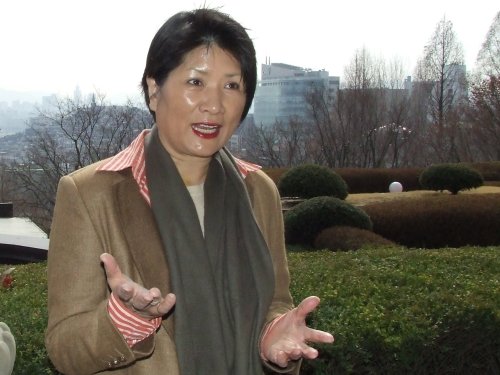There are steps to take to eliminate the burden that over 1 billion people living on under $1 a day share.
The United Nations World Tourism Organization’s ST-EP Foundation chairperson Dho Young-shim started the foundation five years ago under the umbrella of the UN Millennium Development Goals.
Today, the group is in about 30 countries in Africa, Asia, Latin America, Europe and the Middle East.
“Most of our projects are in Africa; it’s because the least developed countries in the world are in sub-Saharan Africa. Those are the countries that need the most help,” Dho told The Korea Herald.
ST-EP, which stands for Sustainable Development for the Elimination of Poverty, shares the same aim as the MDG ― to end poverty by 2015.
Dho explained that she was intrigued as to why, after half a decade, countries in Africa have not moved forward in eliminating poverty.
As a lawmaker, Dho has worked to bring Korea to the forefront of the world. As a chairperson for ST-EP, she brings poverty to the forefront of people’s consciousness in the hope of eradicating it through education.
“In my small way I want to tell them that there is a way to reduce poverty,” she said.
“So I introduced small projects through the tourism sector which is a very important industry in that part of the world because it brings foreign currency and creates jobs.
“They make handicrafts and sell them to tourists so it gives them an income to buy bread and feed their children and it empowers them because, in a way, it’s their own company,” she said.
 |
United Nations World Tourism Organization’s ST-EP Foundation chairperson Dho Young-shim. (Yoav Cerralbo/The Korea Herald) |
Yet, the problem of poverty has remained, so Dho uses what she knows best: the Korean experience as a model for development assistance.
“I know what it means to be poor, I used to be poor, I was born in a country that had $89 GDP income, so education is key,” she said. “They have to change their own mentality and attitude. Education is the only way to achieve this goal.”
With a plan in hand, Dho and the ST-EP Foundation started the Small Library campaign.
The idea is simple ― establishing small libraries in underprivileged communities where children do not have the basic necessities to study.
The main purpose is to provide them with educational and entertainment opportunities through the enjoyment of reading. This initiative is also a way to promote the ST-EP program to government officials at the national and local levels.
From Mali to Zimbabwe, the idea was a hit and today there are 80 schools worldwide.
To help cut costs, Dho asks the local communities to reserve a room either in a school, a community center or anywhere that is feasible. The ST-EP Foundation purchases within the community the materials and labor needed to renovate the rooms. The tables and chairs are also made using local materials.
As for the books, Dho only brings a few Korean folktales with her; the rest of the books in the library are decided on by a team of local teachers.
Also, the computers used in the libraries are purchased in the country’s capital city.
But one problem remained: how to encourage a young child to travel up to 10 kilometers by foot to study when he or she has an empty stomach?
“We tried many things. We gave them a little bag of rice to attract the kids, it was so popular that we couldn’t afford the rice anymore, so many people came,” she said with a proud smile.
“They came because of the food not because of the books; that is the situation there so I then shipped Korean choco-pies. It was unbelievable, the response. I even brought Korean popcorn including the machine to make it. It was also very popular.”
Dho added that she always makes sure that the children have new books. As a child and being the last sibling in her family, she “hated” receiving her sister’s hand-me-downs.
“I want them to have a good connection with the books,” she said. “Imagine a child reading a fairytale and eating a choco-pie, that’s paradise for them, they will not ask for anything more or exchange it for anything else.”
Dho is hoping to set up a global fund with the assistance of people such as U.S. President Barack Obama, U.N. Secretary General Ban Ki-moon, Microsoft founder Bill Gates, CNN founder Ted Turner, singer Bob Geldof, and Qatar’s Sheikha Mozah Bint Nasser at the helm.
“She is perfect for the job because she strongly believes in education; she believes that education is an infinite resource,” said Dho of Sheikha Mozah Bint Nasser.
This year the ST-EP Foundation will open another 26 libraries. The new countries on her list include the Democratic Republic of Congo, South Africa and Burkina Faso.
“I avoid countries that have political instability because I don’t want my staff to get in trouble,” she said.
One question remains: How close are the UN’s MDG to eliminating poverty?
The answer can be found with the Small Libraries campaign. The first libraries that were set up did not have access to electricity. Dho had to import solar panels from Korea to power the small rooms. Today, everywhere Dho goes there is electricity available for her libraries to take hold.
With the ST-EP’s headquarters in Seoul, Dho, with her love for education and children, plans to continue her work in bringing Korean educational values to eradicate poverty.
By Yoav Cerralbo (
yoav@heraldcorp.com)





![[Herald Interview] 'Korea, don't repeat Hong Kong's mistakes on foreign caregivers'](http://res.heraldm.com/phpwas/restmb_idxmake.php?idx=644&simg=/content/image/2024/11/13/20241113050481_0.jpg)
![[KH Explains] Why Yoon golfing is so controversial](http://res.heraldm.com/phpwas/restmb_idxmake.php?idx=644&simg=/content/image/2024/11/13/20241113050608_0.jpg)

